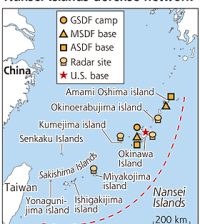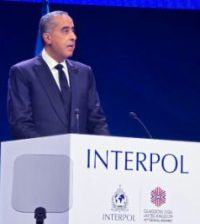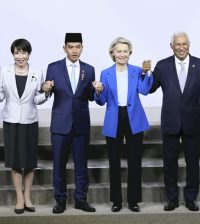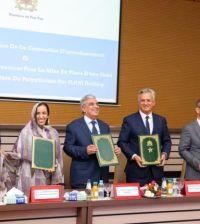- Washington “follows with interest” Morocco’s openness onto Africa (John Kerry)Posted 12 years ago
- The trial of South African Paralympic champion Oscar Pistorius opened in Pretoria on Monday.Posted 12 years ago
- USA welcomes efforts of King Mohammed VI in MaliPosted 12 years ago
- Egypt’s population reaches 94 millionPosted 12 years ago
- Mugabe celebrates his 90thPosted 12 years ago
- Moroccan Monarch to Build a Perinatal Clinic in BamakoPosted 12 years ago
- King Mohammed VI handed a donation of bovine semen for the benefit of Malian breeders.Posted 12 years ago
- Moroccan King’s strategic tour to Africa: Strengthening the will of pan African Solidarity and stimulating the south-south cooperation mechanisms over the continentPosted 13 years ago
- Senior al-Qaida leader killed in AlgeriaPosted 13 years ago
- Libya: The trial of former Prime Minister al-Baghdadi AliPosted 13 years ago
King Mohammed VI at The Opening Ceremony Of Moroccan-Ivorian Economic Forum: Reinforcing capacity-building in African States for a sustainable development
In a speech opening the first-ever Moroccan-Ivorian Economic Forum held in Abidjan, Cote d’Ivoire yesterday, Morocco’s King Mohammed VI lauded Cote d’Ivoire’s economic progress and the two countries’ growing economic partnership.
He emphasized the need for more cooperation across the continent, as well as private-sector investment, to spur development. The Forum served as the cornerstone of the King’s visit to Cote d’Ivoire — the second leg of a four-nation Africa trip that has already taken him to Mali and will continue on to Guinea and Gabon.
“Whereas the last century was that of the independence of African States, the 21st century should be that of African peoples’ triumph over the ravages of underdevelopment, poverty and exclusion,” said the King to an audience of Moroccan and Ivorian dignitaries, including Prime Minister Daniel Kablan Duncan.
The King said that “Africa should learn to trust Africa,” and that “the continent’s wealth should benefit African peoples.” The Moroccan sovereign highlighted that “for sustainable development to take place in Africa, the creativity and dynamism of the private sector should focus on specific promising areas such as agriculture, industry, science and technology, and infrastructure development…”
“A vibrant, developed Africa is not merely a dream for tomorrow; it can be a reality today, provided we take action,” said the King. But to do so requires rising to “the challenges which threaten its political stability and hinder its socioeconomic development,” overcoming “Afro-pessimism,” and unlocking “its intellectual and material potential as well as that of all African peoples.”
The King’s remarks come after a five-day visit to Mali, where he presided with Malian President Ibrahim Boubacar Keita over the signing of 17 bilateral cooperation agreements focusing on a broad range of economic and development matters.
Over this week, King Mohammed VI will also visit Guinea and Gabon.
The full text of the speech is as follows:
“Praise be to God May peace and blessings be upon The prophet, His Kith and Kin
Mr. Prime Minister,
Your Excellencies,
Ladies and Gentlemen,
It is a great pleasure to be in Côte d’Ivoire once again, almost a year to the day after my State Visit.
Despite the short time between the two visits, the important progress being made across the board in Côte d’Ivoire is quite clear, thanks to President Ouattara’s resolute, far-sighted action and the civic commitment of all of the nation’s stakeholders.
It is therefore with a keen sense of optimism and confidence that I am addressing the Morocco-Côte d’Ivoire Economic Forum, which reflects our determination to strengthen relations between our two countries by giving fresh momentum to our economic cooperation.
The convening of such a Forum in Côte d’Ivoire, for the first time outside the Kingdom of Morocco, and on African soil, has not come about by chance.
First, it attests to the quality of the relations between our two countries. It is also testimony to the important political and economic ties between the Kingdom of Morocco and countries in Central and West Africa.
Furthermore, it is a clear indication of just how vibrant the economy of Côte d’Ivoire is, and how confident we are in its future.
If Côte d’Ivoire has one of the region’s most active industrial bases and constitutes one of the most dynamic trading platforms, there are good reasons for it.
Now that the political twists and turns are a thing of the past, the unity and peace which have been regained are certainly Côte d’ Ivoire’s greatest source of strength. The country’s prosperous economic past undoubtedly gives it a comparative advantage.
Mr. Prime Minister,
Your Excellencies,
Ladies and Gentlemen,
Morocco, just like Côte d’Ivoire, fully adheres to its African calling, as it always has throughout its history.
Today, as in the past, diplomatic relations are at the heart of our relationship. Even so, and considering the profound changes affecting the world, the mechanisms and scope of diplomacy – even its status in international relations – are expected to adapt to new realities.
In the past, diplomacy served to consolidate political ties. Today, it is the economic dimension which predominates. It is a crucial component of diplomatic relations.
At one time, cooperation was based on trust and on historical ties. Today, it increasingly hinges on efficiency, performance and credibility.
Efficiency always bears fruit. It guarantees tangible results, measurable progress as well as the capacity to come up to expectations. It also provides the assurance of quality and generates trust.
As for credibility, it requires that the continent’s wealth should benefit African peoples in the first place. This means South/South cooperation should be at the heart of inter-African economic partnerships.
A continent committed to openness, Africa will continue to develop fruitful relations with the countries with which it has the deepest historical ties as well as the greatest affinity. Although they are definitely an asset, these links are not in themselves sufficient.
Nowadays, they should be accompanied by credible action and unwavering commitment. There are no longer any conquered lands or exclusive preserves. To believe otherwise would be an illusion.
It would be just as unrealistic to think that there are small projects and big ones.
All projects are important, provided they are relevant and designed to serve the citizen.
Needless to say, there are projects which have nation-wide significance and impact. Morocco knows this firsthand. Our infrastructure projects have been entirely carried out relying on Moroccan expertise – from design to actual implementation – be it highways, electrification projects, dam, port or airport construction…etc.
However, there are also projects which, although smaller in scale, are particularly important because they have a direct bearing on the citizens and aim to improve their daily lives. This is the case of the fishing village we are launching here in Côte d’Ivoire.
Projects such as these contribute to job creation and to the expansion of small and medium-sized businesses and industries, which are the continent’s real engine of growth and the main job provider for its young people.
Mr. Prime Minister,
Your Excellencies,
Ladies and Gentlemen,
Whether we look at it from the angle of the continent’s dynamic forces, its resources or its potential, Africa is a great continent. It therefore has to take its destiny in its own hands. Africa is no longer a colonized continent. This is why Africa should learn to trust Africa.
Our continent does not need assistance so much as mutually profitable partnerships. Africa needs human and social development projects much more than it needs humanitarian aid.
Africa should no longer remain shackled by its past and its current political, economic and social problems. It must look to the future with optimism and resolve and make the most of its strengths and potential.
Whereas the last century was that of the independence of African States, the 21st century should be that of African peoples’ triumph over the ravages of underdevelopment, poverty and exclusion.
Mr. Prime Minister,
Your Excellencies,
Ladies and Gentlemen,
A vibrant, developed Africa is not merely a dream for tomorrow; it can be a reality today, provided we take action.
Therefore, now is the time to act or to make a start.
Indeed, it is essential to act because that is what makes political action credible; that is what makes it possible to achieve the desired objectives.
Africa must rise to many challenges which threaten its political stability and hinder its socioeconomic development.
Those challenges, however, can only be met through cooperation, solidarity between African peoples, and respect for the States’ sovereignty and territorial integrity.
Africa can benefit from its enormous potential, but without being self-sufficient.
Africa should forge further fruitful partnerships with the many developed countries that show a constant interest in and sincere commitment to economic progress and human development in Africa, while being actively involved in them.
It should also benefit from the opportunities offered by triangular cooperation as an innovative tool that facilitates joint efforts and helps achieve optimum use of resources.
A pioneer in this cooperation mechanism, Morocco is willing to put its credibility and the trust it enjoys with its partners at the service of sister African nations.
It is our collective duty to make sure globalization becomes a positive force conducive to development in Africa. In this respect, economic development, trade and regional integration are key issues.
Mr. Prime Minister,
Your Excellencies,
Ladies and Gentlemen,
For sustainable development to take place in Africa, the creativity and dynamism of the private sector should focus on specific promising areas such as agriculture, industry, science and technology, and infrastructure development.
In order to achieve this objective, resources must be mobilized and private enterprise boosted, which presumably means there has to be a capable and efficient public sector. Leveraging South-South public-private partnerships and the transfer of technology are key elements in this respect.
This makes institutional capacity-building in African States a strategic objective. Better governance, progress based on the rule of law and the peaceful settlement of conflicts must constitute shared priorities.
Thanks to the development of the banking sector, the urbanization of the population and African workers’ constantly increasing productivity, new prospects for the achievement of prosperity for future generations are opening up on a daily basis in Africa.
This objective will be even more readily attainable when Africa overcomes its Afro-pessimism and unlocks its intellectual and material potential as well as that of all African peoples.
Just imagine what our continent will look like, once it frees itself of its constraints and burdens!
I wish your Economic Forum every success and would like to say how much I trust your pragmatism, creativity and ability to achieve tangible results and contribute to the development of our two sister nations as well as their respective regions.
Wassalamu alaikum warahmatullah wabarakatuh.”




